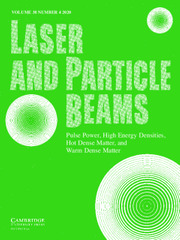Article contents
Laser-driven electron acceleration in hydrogen pair-ion plasma containing electron impurities
Published online by Cambridge University Press: 25 July 2018
Abstract
In this paper, the intense laser heating of hydrogen pair-ion plasma with and without electron impurities through investigation of related nonlinear phenomena has been studied in detail, using a developed relativistic particle-in-cell simulation code. It is shown that the presence of electron impurities has an essential role in the behavior of nonlinear phenomena contributing to the laser absorption including phase mixing, wave breaking, and stimulated scatterings. The inclusion of electron into an initial pure hydrogen plasma not only causes the occurrence of stimulated scattering considerably but also leads to the faster phase-mixing and wave breaking of the excited electrostatic modes in the system. These nonlinear phenomena increase the laser absorption rate in several orders of magnitude via inclusion of the electrons into a pure hydrogen pair-ion plasma. Moreover, results show that the electrons involved in enough low-density hydrogen pair-ion plasma can be accelerated to the MeV energy range.
Keywords
- Type
- Research Article
- Information
- Copyright
- Copyright © Cambridge University Press 2018
References
- 8
- Cited by


